Top Bars in Chengdu – Most Viewed (2025)
Discover Chengdu's laid-back bar scene with riverside cocktail bars along the Jinjiang, hidden speakeasies in Kuanzhai Alleys, and lively craft beer taprooms around Taikoo Li. Experience traditional tea houses reimagined as modern lounges, baijiu-forward bars showcasing Sichuan spirits, and rooftop venues with views over Tianfu Square. From Sichuan peppercorn–infused cocktails and hotpot-friendly drink pairings to cozy courtyard bars, Chengdu blends relaxed pace, culinary excellence, and creative mixology in Southwest China's panda capital.
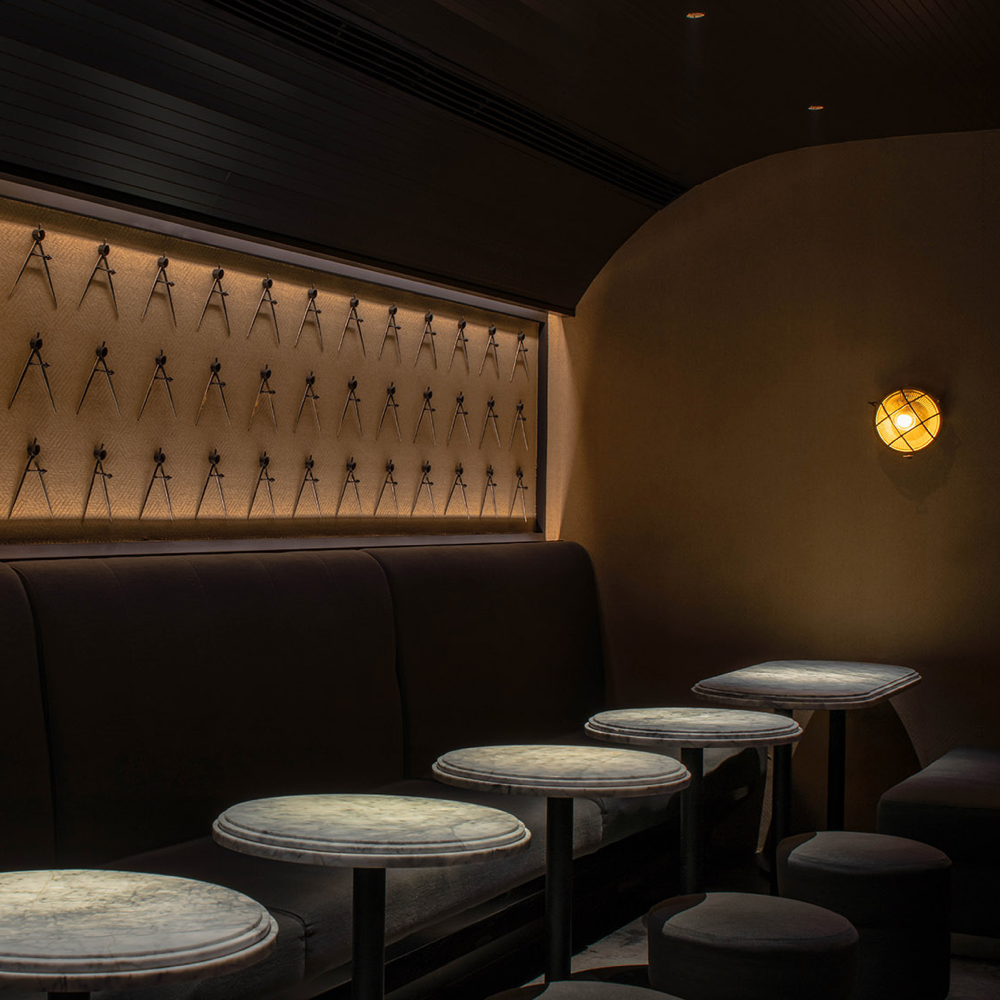
Behind the unassuming façade of a retro barber shop in Chengdu’s Jinjiang District lies Bar π — an elegant secret waiting to be revealed. As guests slip into the elevator concealed behind the shop’s back, they are transported into four intimate chambers evoking European train carriages, vintage offices, and mid-century American design. The architecture and interior are by Chinese design studio iZ, and the aesthetic is a mix of reduced scale, compressed ceiling heights, warm woods, moody lighting, and design motifs that echo geometry and the drafting compass. Bar π’s concept fuses the mysterious aura of speakeasies with cerebral symbolism: the name “π” (pi) recurs in drinks and décor, and walls are adorned with compass and geometric references. The menu leans into local creativity: their signature cocktail “π” is said to be crafted from 80 kinds of Chinese herbal materials soaked in three liquors, heated gently, then chilled — an ambitious infusion of tradition and mixology. The drink list is likely dynamic, with thematic nods to mathematics, geometry, and precision. The ambiance is hushed and refined. Loungers, banquette seating, low tables, and soft lighting encourage quiet conversation, while design touches — brass elements, vintage furniture, tapestry and subtle lighting — reinforce the sense of hidden elegance. A VIP room inside offers an even more secluded experience, with its own mini bar. Though small (≈ 135 sqm) across the rooms, every corner feels intentionally crafted to balance privacy and design drama. Operating hours straddle day and night: it opens from the afternoon through evening (e.g. 9:00 am to 5:00 pm) before closing briefly, then reopens around 7:00 pm till late (approx. 2:00 am). The bar draws those who appreciate subtlety, sipping under soft jazz or ambient cues, sipping cocktails that demand attention. It’s less about spectacle and more about discovery — finding yourself in a realm of whispering elegance and intellectual allure. In short: Bar π isn’t just a bar — it’s an experience of hidden doors, precision craft, and design poetry in Chengdu’s nightlife scene.
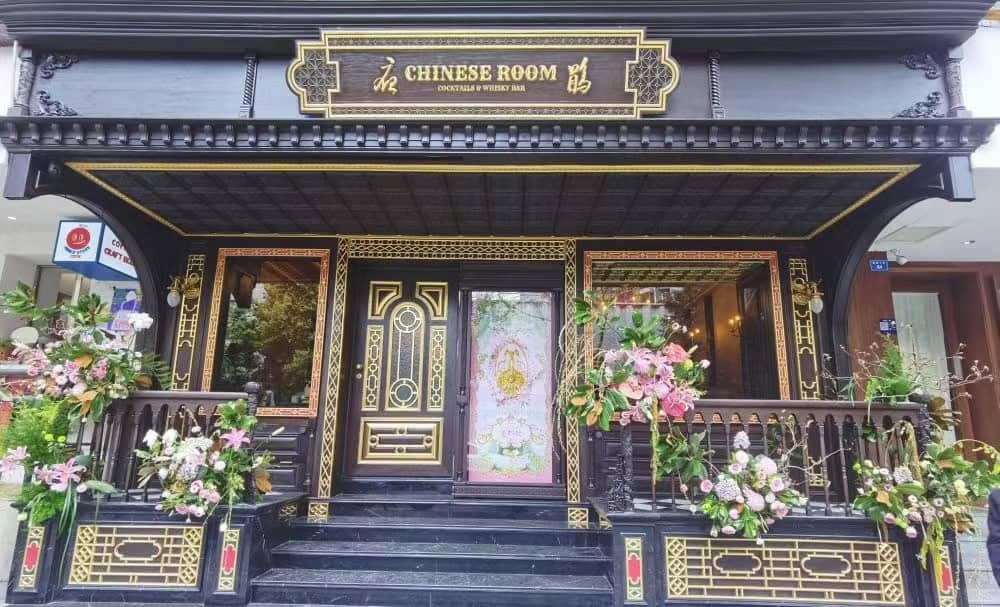
Tucked into the heart of Chengdu’s Jinjiang District, Chinese Room (夜鹃 / Chinese Room Cocktail Bar) is a bar where cross-cultural drama and lavish detail coalesce. It presents itself as Chengdu’s first French-Chinese style bar, combining the opulence of European Rococo aesthetics with traditional Chinese motifs and a sense of theatrical grandeur. Stepping inside, you might feel transported: velvety fabrics, carved wood screens, gilded moldings, porcelain accents, and saturated colors frame every corner. The space is divided into a main bar area plus several independent rooms, each with its own theme and design — yet tied together by the bar’s overarching vision of East meets West. Contrasting elements — Chinese latticework, folding fans, zodiac iconography — are woven into classical European furnishings. The cocktail menu is a statement piece in itself. Designed in the style of folding fans and wooden parchments, the menu features themed drinks — many named after the twelve zodiac animals — and served in distinctive vessels. Reportedly, each cocktail carries a twist of local flavors, blending global technique with regional character. In terms of operations, the bar opens in two shifts: one in the afternoon (11:30 am to 17:30 pm) and then evening to late (19:30 pm to 02:00 am). This split schedule is common in upscale bars that also cater to tea/afternoon-cocktail hybrid service. In sum, Chinese Room is more than a bar — it’s a carefully choreographed aesthetic and sensory experience, designed for those who savor ambiance, inventive cocktails, and the thrill of luxury drama in a hidden space.

Nestled in Wuhou district’s Jinxiu Road, The Beer Nest (啤酒窝酒吧) is often hailed as one of Chengdu’s earliest craft beer bars, and remains a local favorite for beer aficionados and casual drinkers alike. Walking in, you’ll find a warm, rustic interior with wood paneling, shelves lined with bottles, ambient lighting, and a modest outdoor terrace for summer evenings. The bar operates “6pm – late” in many listings, though some sources mention earlier opening hours (e.g. 2pm) for events or extended service. What sets Beer Nest apart is its emphasis on craft beer. On tap they typically offer a selection of local brews and imported beers, plus a robust bottle list (circa 60 or more) of classic and specialty beers. Beyond just beer, the bar also offers cocktails, whiskey, wine, and non-alcoholic beverages for those not in beer mode. Beer Nest is also more than a just “drink spot” — it runs regular events like beer pong, open mic or English comedy nights (especially Friday/Saturday), themed parties, and promotional “happy hour” deals. It is part social hub, part craft beer showcase, and part chill lounge for locals and ex-pats to gather. In terms of legacy, it is said to have been founded by a Belgian expat and contributed to the early growth of beer culture in Chengdu. According to travel blogs, The Beer Nest #1 (its original location) once had 4 self-brewed taps among its offerings. Later, a second branch, The Beer Nest II, was established with expanded kitchen and beer options. Over time, it’s maintained its charm — people speak of returning for its cozy ambiance, beer variety, and events. In sum: The Beer Nest is a foundational craft beer bar in Chengdu. It’s not glitzy, but it’s real. It’s for beer lovers, for people who want a laid-back night with good pours, occasional live entertainment, and a homey bar experience in the city.
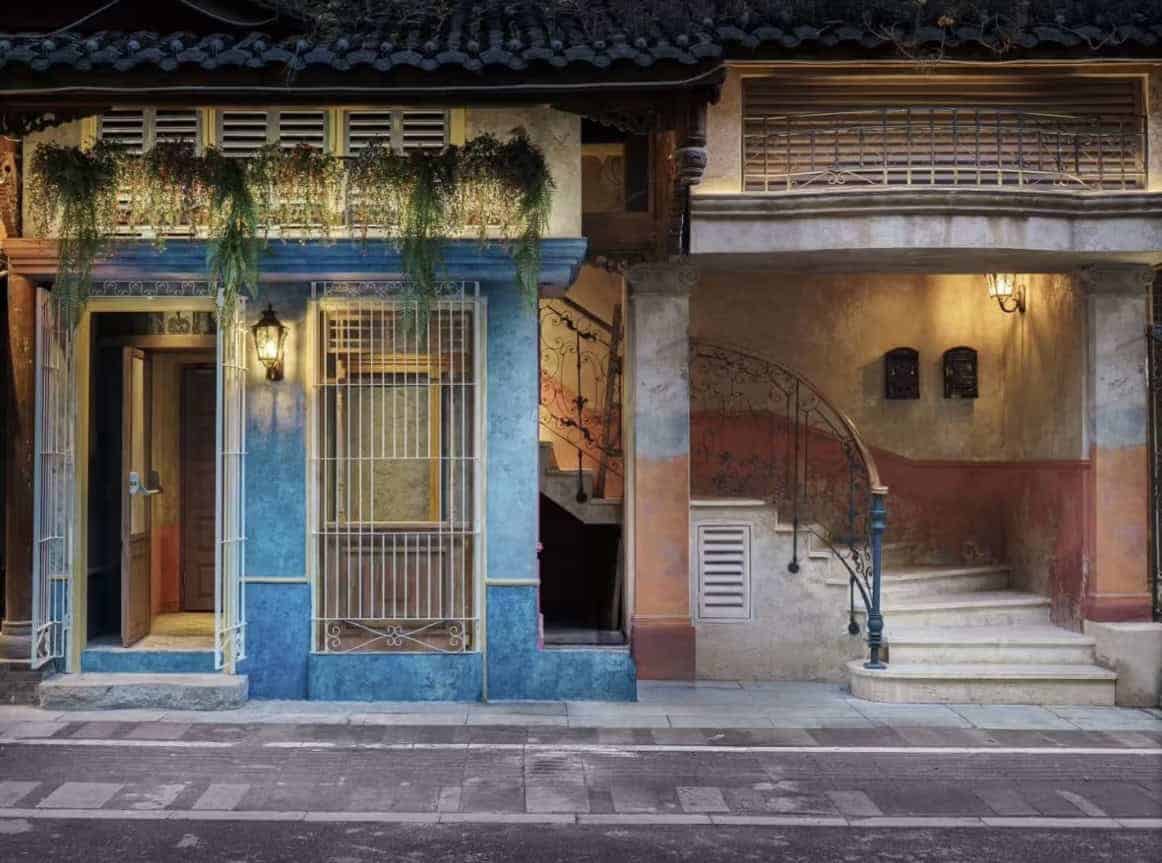
Slip off the main streets and down a narrow lane in Jinjiang District, and you’ll find Mamacita — a Cuban-inspired cocktail bar wrapped in secrecy and spirit. Behind the unassuming façade at Dachuan Lane (大川巷), this speakeasy aims to transport you to Havana’s alleys rather than Chengdu’s bustle. You enter softly: vintage posters, warm lighting, aged walls, and tropical plants set the mood. Salsa, rum, and whispering conversations are all part of the texture. Though small in scale, the bar feels intimate: close seating, elegant woodwork, and a curated décor that leans more soulful than flashy. The sound level is tuned to conversation, not dance — a place to linger with a drink, not to shake the floor. Cocktails lean on authenticity. Think rum-forward concoctions infused with tropical fruit, citrus, mint, and subtle local touches. The “Havana Breeze” is mentioned by patrons for being smooth, balanced, and refreshing. Bartenders are described as approachable and well versed — ready to guide but never overbearing. Opening hours tend to be evening-oriented: typically 19:00 to 02:00, Tuesday through Sunday. Some nights may bring special events, DJ guests, or live takes on Latin jazz or salsa. Because of its hidden nature, Mamacita feels like a discovery: a quiet gem in Chengdu’s nightlife map. It’s ideal for those who appreciate detail, atmosphere, and the sense of being somewhere a bit off the beaten path — a drink with character, a conversation that lingers, and Havana heart in Sichuan streets.
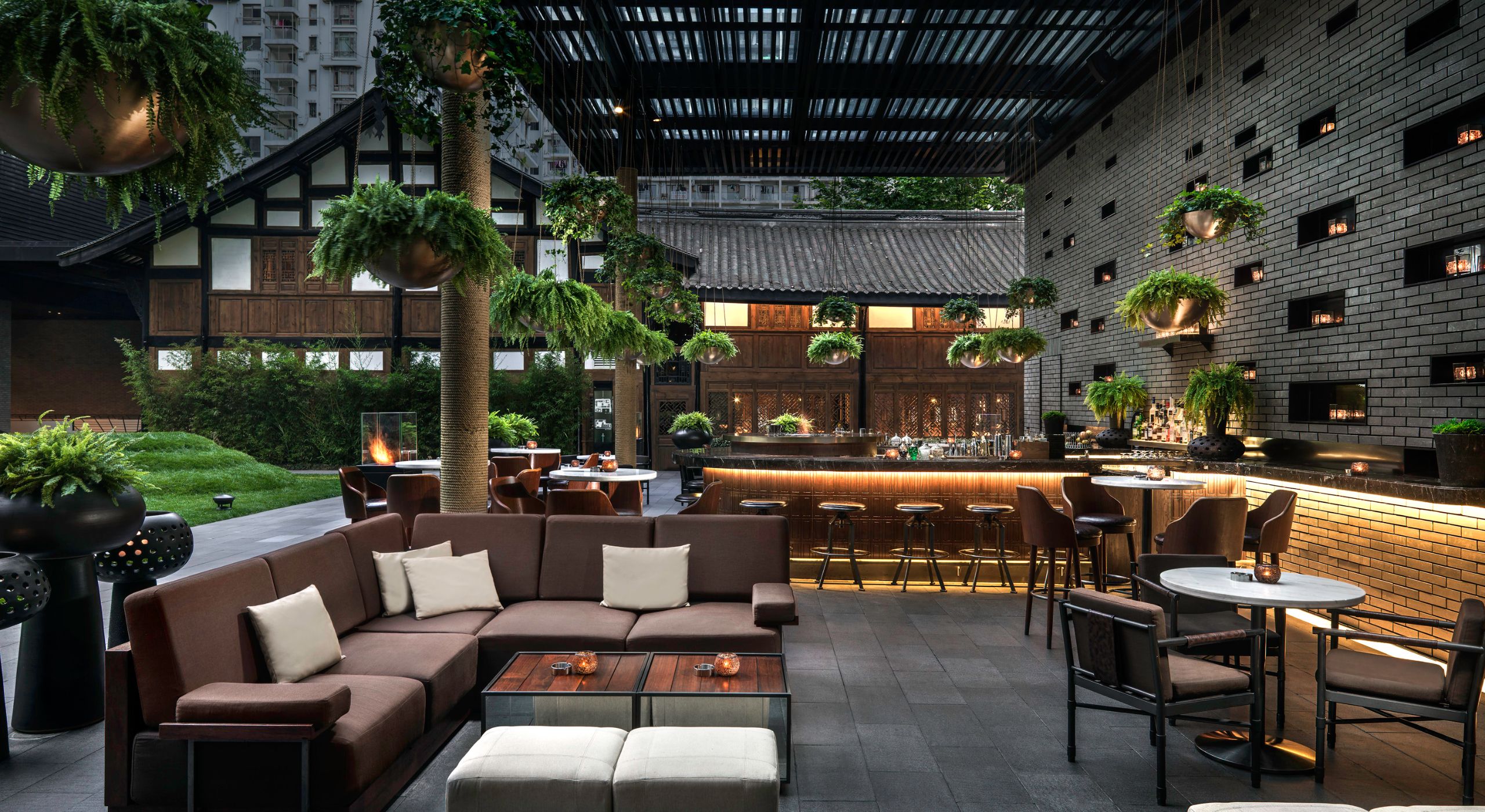
Step into Jing Bar & Lounge, nestled within the elegant confines of The Temple House in Chengdu, and you enter a world where past and present converse over cocktails. Designed in a Jazz-Era motif with sleek Art Deco touches, the bar blends whispers of 1930s glam with a modern sensibility and regional flair. Slip in after dark and you’ll find plush seating bathed in moody lighting, metallic accents, and a bar that both commands attention and invites quiet moments. Jing’s drink menu isn’t just a playbook of classics — it’s a crafted journey. Expect signature cocktails that weave in Sichuan influences (think subtle spice, local herbs or teas), alongside international standards, local beers, Champagne by the glass, and curated wine selections. The “Bartender’s Journey” menu, helmed by their head mixologist, refreshes the lineup regularly to surprise the palate. Music is an essential part of the experience. DJs spin sultry sets in the evening, elevating the lounge vibe without overpowering the space. On warm nights, the outdoor terrace and landscaped seating areas carry soft ambient sounds and let guests mingle al fresco, ideal for a late drink under the city lights. Jing doesn’t just lean on aesthetics — the food & snack side complements the drinks. Expect light bar-style bites and finger food to accompany your late-night sips. Reviews frequently mention “killer cocktails” and local favorites like a Sichuan Negroni, and praise both the service and stylish setting. In short: Jing is a destination bar. It’s not just “in a hotel” — it’s a reason to visit The Temple House. Whether you’re winding down after exploring Chunxi Road, meeting friends, or simply seeking a sophisticated late-night retreat, Jing offers warmth, creativity, and mood in equal measure.
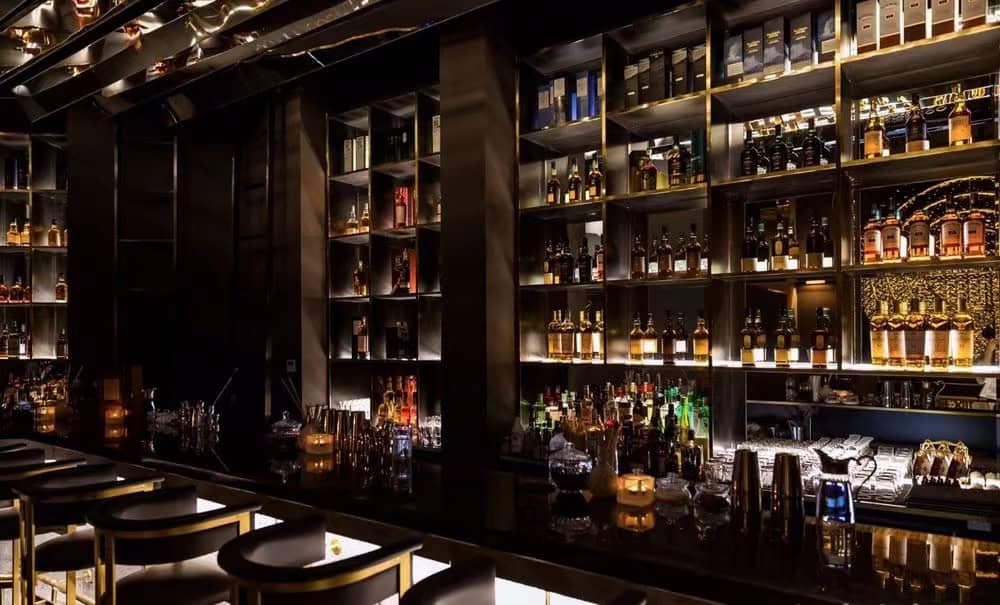
Hidden in the alleys of Jinjiang District, BAR.Chill (sometimes stylized “Bar Chill / BAR.Chill”) is one of Chengdu’s standout cocktail lounges, known for its bold interior, inventive drinks, and immersive atmosphere. Enter via the narrow lane of Dachuan Lane (大川巷), and you’ll arrive at a space that blends industrial aesthetics, local character, and mixologist ambition. The bar is run by siblings “John & 沐子,” who have cultivated a reputation for daring flavor experiments and playful guest interaction. The interior leans into rawness: exposed pipes, concrete textures, moody lighting, and scattered art pieces that feel urban yet curated. This isn’t minimal “sterile industrial” — there’s warmth and personality in how the space is layered. According to reviews, the design leaves a strong impression. But the heart is the cocktail program. BAR.Chill is known for combining modern techniques (low-temperature infusions, rotating distillations) with local ingredients, creating drinks you won’t find elsewhere. For instance: 糯米风味伏特加 (glutinous rice–flavored vodka), 芽菜风味白朗姆酒 (sprout-flavored rum), and liqueurs infused with lotus leaf, green cardamom, etc. Their Sichuan-themed series like “自摸清一色” reference local culture and add memorability to each sip. The experience is interactive: staff are known to lead light banter or even “punishment games” if you lose a bar game, adding a layer of theater to the night. The crowd is often a mix of local cocktail enthusiasts, curious travelers, and design-minded drinkers. On Trip.com, BAR.Chill is ranked high (“No. 3 of Bars in Chengdu”) with praise for its design and bartending team. Opening late (usually 19:30 to 02:00), BAR.Chill is best visited after dark, when lights and shadows play, drinks glow, and ambiance comes alive. It’s a place where patrons linger, probe the menu, and linger over flavors — not rush through shots. In brief: BAR.Chill is a design-forward, flavor-forward cocktail lounge in Chengdu’s alley network, marrying industrial mood with local ingenuity and a sense of performance. For those interested in drinking as exploration, BAR.Chill delivers.
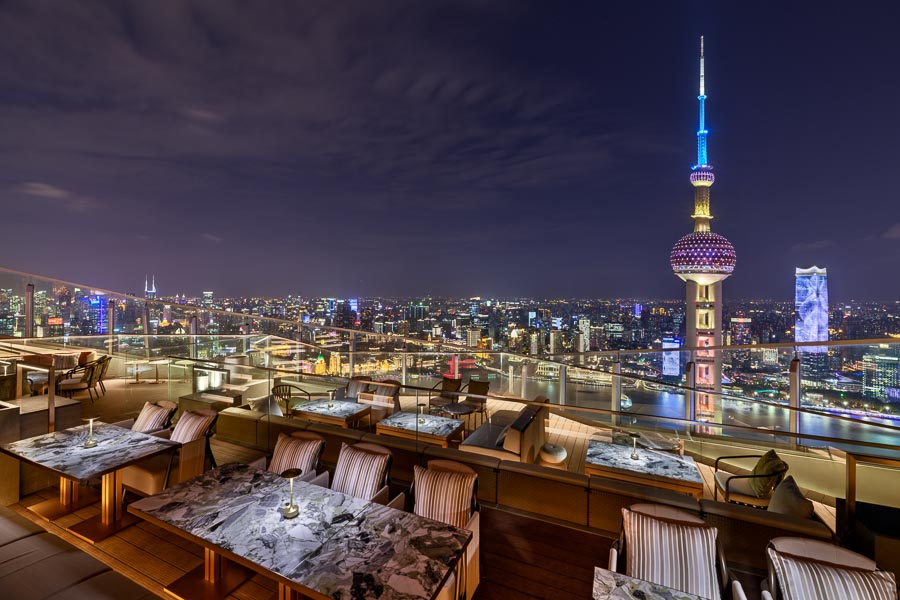
Perched high above Chengdu in The Ritz-Carlton, Flair Restaurant & Bar offers a refined rooftop lounge experience that blends skyline vistas, stylish interiors, and a culinary + cocktail edge. By day, its terrace welcomes guests with light breezes and a relaxed lounge feel; by night, it transforms into a mood-lit space where cocktails, sushi, tapas, and music meet. Inside, the ambiance is sleek and modern, with well-curated lighting, comfortable seating, and an open layout that bridges indoor and outdoor zones. The bar features a well stocked cellar, with selections of wines, single-malt whiskies, cognacs, and spirits. The menu leans “Asian-inspired tapas,” served indoors and on the outdoor patio, allowing guests to graze while enjoying the views. In the evenings, the rooftop area becomes a social hub: DJ sets, soft music, and a gentle buzz of conversation. The setting is elevated but not overly formal — suitable for date nights, nightlife meets, or winding down after a day in the city. According to reviews, guests praise the views over downtown Chengdu, the attentive service, and the cocktail + food pairing. Because Flair is heralded as the highest lifestyle restaurant & bar in Chengdu (on the Ritz-Carlton property) it capitalizes on altitude and panorama as part of its draw. For sundown, it’s a favored spot to relax with a drink, let the city lights unfold below, and enjoy elevated tapas or sushi with friends or guests. In short, Flair is not just “the hotel bar” — it’s a rooftop destination. The mix of views, cocktail craft, light bites, wine & spirits depth, and DJ ambiance makes it a standout for those wanting a stylish night out above Chengdu’s streets.
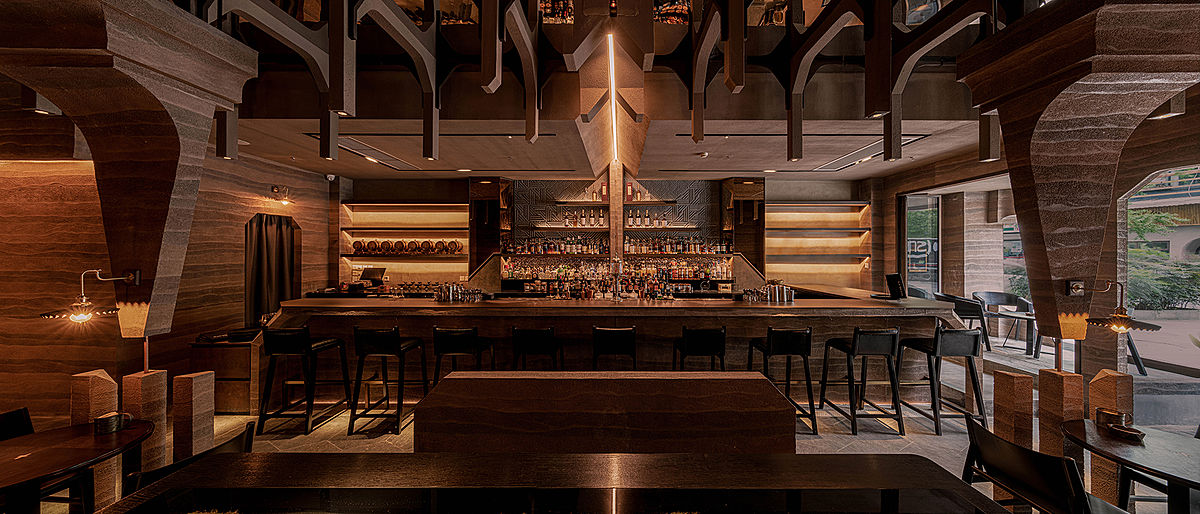
Tucked not too far from Niuwangmiao Station (Metro Lines 2 & 6) in Jinjiang District, La Beato Cocktail Bar offers one of Chengdu’s more theatrical and visually arresting cocktail experiences. Its name, derived from the Spanish “beato” (blessed), hints at the ambitious blend of mysticism and craftsmanship that defines its identity. Inside, the décor leans into an ancient Egyptian aesthetic: think sand tones, layered arches, stylized columns, warm bronze accents, and lighting that evokes sunset hues. The drink menu itself is designed in the style of papyrus scrolls, enhancing the sense of stepping into another era. Cocktails here focus heavily on gin and botanical infusions. Many of the house creations explore the interplay of herbs, spices, florals, and local Chinese ingredients. Patrons mention signature drinks like “Ankh” (a blend of apple gin, soju, milk, cinnamon, pear juice) and “Golden Tribute” (served with dry ice theatrics). The combination of theatrical presentation and flavor-forward technique gives La Beato a dual appeal: it’s both Instagram-worthy and sip-worthy. The service is reportedly polished and immersive: bartenders are attentive, able to explain the stories behind each concoction, and the overall vibe encourages lingering rather than rushing. Many reviewers say the bar often fills up by around 9 pm, so arriving early or booking is wise. La Beato typically operates nightly from 19:30 to 02:00. Its inner magic is in how it combines immersive theming, botanical artistry, visual drama, and a boutique scale — a place you go not just to drink, but to be transported.
